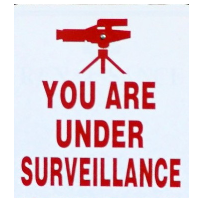L.A. Cops Argue in Court that All Vehicles and Their Drivers Are Under Investigation

Consider yourself warned.
Los Angeles law enforcement officials regard all vehicles they encounter to be under investigation and therefore subject to electronic scrutiny that might otherwise be forbidden by law.
That was the line taken by LAPD and the L.A. County Sheriff's Department when they responded in Los Angeles Superior Court to a request from the Electronic Frontier Foundation (EFF) and the American Civil Liberties Union (ACLU) of Southern California for access to a week's worth of Automatic License Plate Reader (ALPR) data.
Much of the ALPR data is gathered automatically, without regard to the subject, as an equipped police vehicle approaches a civilian. The system automatically snaps a picture of the plate, calculates the date and location, and matches the information against various “hotlists” to see if a person has been naughty or nice. No suspicion of criminal behavior or intent is necessary to trigger a process that will store the information in a computer system for future access.
The EFF and ACLU argue that scooping up data in that fashion is a blatant violation of the U.S. Constitution's Fourth Amendment that prohibits the use of general warrants that don't target specific people for specific actions.
The cops argued that their arbitrary scanning and storage of license-plate information is legal because, “All [license plate] data is investigatory.” In other words, if the cops do it, it must be legal.
Taken to its logical conclusion, the EFF responded, “the agencies’ arguments would allow law enforcement to conduct around-the-clock surveillance on every aspect of our lives and store those records indefinitely on the off-chance they may aid in solving a crime at some previously undetermined date in the future.”
The EFF and ACLU sought the scanner data through a California Public Records Act request as part of a larger investigation of the effect technology is having on constitutional rights.
In a neat twist of logic, LAPD's legal brief argued that the department couldn't release the data because it is private and sharing the information would be wrong. “LAPD is not only asserting vehicle owners’ privacy interests. It is recognizing that those interests are grounded in federal and state law, particularly the California Constitution. Maintaining the confidentiality of ALPR data is critical . . . in relation to protecting individual citizens’ privacy interests.”
The ALPR system from Vigilant Solutions is a powerful tool for profiling individuals, as attested to in the company's promotional video. The system “groups LPR detections around addresses, tells you how many visits to these addresses have been made by an LPR-equipped vehicle, tells you how many times a suspect vehicle has been seen at each location, tells you if a suspect is more likely to be seen during the day or night at the suspect location, tells you the most recent and most popular locations, provides you with an interactive and chronological map view and generates a simple Locator Score for each address.”
Residents of metropolitan Los Angeles would be properly forewarned that law enforcement considers them a suspect—and that they should be careful about making any suspicious moves, like driving a car.
–Ken Broder
To Learn More:
Los Angeles Cops Argue All Cars in LA Are Under Investigation (by Jennifer Lynch, Electronic Frontier Foundation)
Drive in Los Angeles? You Could Be Under Investigation—But the Cops Aren’t Saying (by Travis Gettys, The Raw Story)
Do License Plate Readers Invade Privacy, or Are They a Protected Form of Free Speech? (by Noel Brinkerhoff, AllGov)
- Top Stories
- Controversies
- Where is the Money Going?
- California and the Nation
- Appointments and Resignations
- Unusual News
- Latest News
- California Forbids U.S. Immigration Agents from Pretending to be Police
- California Lawmakers Urged to Strip “Self-Dealing” Tax Board of Its Duties
- Big Oil’s Grip on California
- Santa Cruz Police See Homeland Security Betrayal in Use of Gang Roundup as Cover for Immigration Raid
- Oil Companies Face Deadline to Stop Polluting California Groundwater





